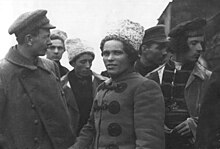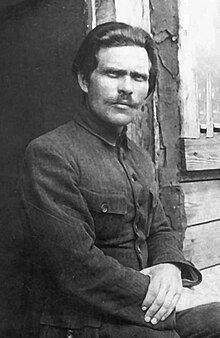Nestor Machno
Nestor Iwanowytsch Makhno ( Ukrainian Нестор Іванович Махно , scientific transliteration. Nestor Ivanovyč Makhno , Russian Нестор Иванович Махно Nestor Ivanovich Makhno , scientific. Transliteration Nestor Ivanovich Makhno ; born October 26 . Jul / 7. November 1888 greg. In Huliaipole , Russian Empire ; † July 6, 1934 in Paris ) was a Ukrainian anarchist who, between 1917 and 1921, during the Russian Civil War, became the leader of the Makhnovshchina , an anarchist popular movement that was named after him and which at times managed to control a considerable part of Ukraine.
Life
Early years
Nestor Machno was born in Huljajpole, in the Yekaterinoslav Governorate in what is now the Ukrainian Oblast of Zaporizhia, the youngest of five children of a poor farming family. The father died when he was ten months old. Because of the poverty, Makhno had to work as a shepherd at the age of seven. From the age of eight he went to school in the winter months, while he worked for local landlords in the summer months. At the age of twelve, Machno left school to work full-time on the estates of nobles, wealthy (including German) settlers and farmers. These settlers and farmers were also called kulaks , albeit without the later pejorative ascription. When he was seventeen, he began an apprenticeship as a painter, later worked as an unskilled worker in an iron foundry and then as a foundryman in the same company. It was there that he made his first experiences with revolutionary political ideas.
Through the events of the Russian Revolution in 1905 and the subsequent repression of the Russian Empire , he began to be interested in anarchism. In his ideas of a free society, Machno was influenced by the ideas of the anarchist theorists and activists Mikhail Bakunin and Prince Kropotkin . In 1906 he became a member of a local group of anarchists that had formed in 1905 and consisted mainly of the sons of the poorer rural population. At the end of 1906, Makhno was arrested for political assassinations and released again in 1907 for lack of evidence. In 1908 the political police had infiltrated the group with informants , so that in 1910 he and thirteen others were sentenced to death by hanging by a military tribunal. Due to his age and his mother's efforts, the sentence was reduced to life imprisonment for hard labor. During his imprisonment, part of his lungs were removed due to tuberculosis. In Butyrka prison in Moscow he befriended Pyotr Andreyevich Arshinov .
Revolution and civil war

Machno in Russia was liberated by the February Revolution of 1917 . He returned to Ukraine, where he started organizing farmers and workers in the local community as chairman of the Rayon Farmers Committee and later as chairman of the local Soviet. By the Peace of Brest-Litovsk in March 1918, Ukraine was politically and economically separated from Soviet Russia . Even before the October Revolution of 1917 and before the land decree was passed by the Bolsheviks , large landowners and entrepreneurs were expropriated and anarchist communes were established.
The Makhno movement (called: Makhnovshchina ) grew rapidly and had the goal of realizing an anarchist Ukraine. Machno's supporters fought with up to 50,000 volunteer partisans in the Ukraine with seven million inhabitants, among whose rural population they had strong support. The Machnos movement was highly agile through the use of horse-drawn carriages or mules (and often armed with machine guns) and peasant wagons, the Tatschankas . Due to their roots in the peasant population, the Muschiki , they not only had their support, but also logistical advantages. The horses were not forcibly requisitioned from the farmers. Documents from Ukrainian and Russian archives, which were previously inaccessible to the public, prove that Machno arranged for payment in cash or in kind. Machnovshchina was able to assert itself successfully against the German and Austrian Central Powers and against the armies of the whites.
In June 1918 Makhno met Lenin through the mediation of Yakov Sverdlov in the Moscow Kremlin , who tried to win the movement for his Bolshevik counter-government in Kharkiv . After its collapse in November 1918, which left a power-political vacuum, the ataman Pavlo Skoropadskyj , who had meanwhile been installed by the German highest army command, was driven out by Machno's troops.
The intervention of Polish, Bolshevik and remaining Ukrainian military units resulted in protracted acts of war in which the Machno movement, the Machnovshchina, successfully defended its positions against the White Army for four years . Officers Anton Ivanovich Denikins were mostly shot by Machno people after they were captured. Ordinary soldiers of the Denikin Army, on the other hand, were let go after they were stripped of their outer clothing. (Uniforms and clothing in general were even scarcer than weapons and ammunition during the turmoil of the civil war.)
Makhno refused to negotiate with the whites and in 1920, after a phase of partisan war against the Soviet government, sided with the Red Army again . Envoys of General Wrangel's White Army were executed.
The victory of the Bolsheviks in the Russian civil war had the political goal of integrating Makhnovshchina into the Red Army, which had previously been allied with it , and of Bolshevising Ukraine. So called Lev Kamenev , the resolution of the independent councils founded by Makhno. On the other hand, there was strong resistance from the ranks of Makhovshchina, which wanted to continue fighting for an anarchist Ukraine. The Red Army, led by Leon Trotsky , finally and forcibly crushed the movement.
Exile and death
Machno himself, who was wounded several times and ailing because of the long-term effects of tuberculosis, was able to flee with his partner Galina via Romania, Poland, Gdansk and Berlin to Paris in 1921 , where he met with Buenaventura Durruti and Francisco Ascaso in 1927 . From 1926 he wrote together with Russian exiles for the monthly Delo Truda and was co-author of the Organizational Platform of Libertarian Communists . This writing became the basic text of platformism , a current of anarchism that was strongly influenced by the experiences of the struggle of Makhnovshchina and relied on a more rigid structure of the revolutionary organization. However, the majority of contemporary anarchists such as Volin and Errico Malatesta saw these ideas as attempts to hierarchize the movement and described and rejected them as the “Bolshevization” of anarchism.
Embittered by the political isolation in France and the developments in the Ukraine, he withdrew more and more. He worked as a carpenter , as a stage worker at the Paris Opera and in a Renault workshop. Nestor Machno died of tuberculosis on July 6, 1934. 500 people attended his funeral in the Père Lachaise cemetery in Paris three days after his death .
See also
literature
- Peter A. Arshinoff : History of the Machno movement . Unrast Verlag, Münster 2008, ISBN 978-3-89771-917-0 .
- Volin : The Unknown Revolution . Volume 3: on the Machno movement. Verlag Association, Hamburg 1976, ISBN 3-88032-011-X .
- Ettore Cinella: Machno in the Ukrainian revolution 1917 to 1921. In: W. Braunschädel (Hrsg.): Archive for the history of resistance and work. No. 17, Fernwald 2003, ISBN 3-88663-417-5 , p. 311 ff.
- Viktor P. Danilov, Viktor V. Kondraˇsin and Teodor Shanin (eds.): Nestor Machno. Krest'janskoe Dviženie na Ukraine 1918–1921. Documentation i Materialy. Rosspen, Moscow 2006
- Nestor Machno (1889-1934). The inventor of modern partisan warfare . In: Ralf Höller (Ed.): I am the fight. Rebels and revolutionaries from six centuries . Structure TB Verlag, Berlin 2001, ISBN 3-7466-8054-9 , p. 257 ff.
- Alexandre Skrida (ed.); Nestor Machno: The Struggle Against the State and other Essays. AK Press, Edinburgh / San Francisco 1996, ISBN 1-873176-78-3 (English).
- Rudolf Naef: Russian Revolution and Bolshevism 1917/18 from an anarchist perspective. Edition AV, Lich 2005, ISBN 3-936049-54-8 .
- Victor Peters: Nestor Machno. The life of an anarchist. Echo Books, Winnipeg, Canada ca.1970 , OCLC 5298027 .
- Rudolf Rocker : Memoirs of a German Anarchist. Suhrkamp, Frankfurt a. M. 1974, ISBN 3-518-00711-4 ( excerpt from Nestor Machno ( Memento from August 16, 2004 in the Internet Archive )).
- Felix Schnell: rooms of horror. Violence and Group Militancy in Ukraine, 1905–1933 . Hamburger Edition: HIS-Verlag, Hamburg 2012, ISBN 978-3868542448 .
- Augustin Souchy : Journey to Russia 1920. Verlag Europäische Ideen and Klaus Guhl Verlag, Berlin 1979, ISBN 3-921572-12-6 . (Original Issue: How the workers and farmers living in Russia and Ukraine result of a study tour from April to October 1920? . Verlag The syndicalist , Fritz Kater , Berlin 1920).
- Mark Zak : Remember me. About Nestor Machno . With an afterword by Bini Adamczak . Edition Nautilus, Hamburg 2018, ISBN 978-3-96054-085-4 .
Movie
- Helene Chatalain, Dimitri Pliouchtch: Nestor Machno - Paysane d'Ukraine . France La Sept-Arte 1996. (German TV title: Nestor Machno - Ukrainian farmer and anarchist .)
- Nikolaj Kaptan, Vladimir Dostal: Devyatch Shisnej Nestora Machno / Девять жизней Нестора Махно . 12-part television film Russia Pervyj Kanal / Первый канал July 2007, based on the novel of the same name by Igor Bolgarin and Viktor Smirnow.
- Bolschaja-malaja woina (Большая — малая война / The Big Little War ), also edited under the title Banda Machno ( The Machno Gang ), directed by Vasile Pescaru, USSR 1980, with Viktor Saitow, Gennadi Sajfulin, Yevgeni Lazarow
Web links
- Literature by and about Nestor Machno in the catalog of the German National Library
- Nestor Machno: The ABC of the revolutionary anarchist
- Multilingual Nestor Makhno archive with historical photos of Machno and the Machnowzi
- Machno biography (eng.)
Individual evidence
- ↑ a b Makhno, Nestor, 1889-1934. In: libcom.org. September 8, 2006, accessed January 7, 2016 .
- ↑ The life of the Ukrainian anarchist leader Nestor Machno - biography in Untergrundblättle ; accessed on October 11, 2018
- ↑ Heiner Becker In: Peter A. Arshinoff : History of the Machno movement. Unrast Verlag, Münster 2009, ISBN 978-3-89771-917-0 , p. 256 ff.
- ↑ In times of war. In: Heise online . February 15, 2009, accessed July 20, 2013 .
- ↑ ANARCHISM / SCRIPTURE: Awakened again . In: Der Spiegel . No. 47 , 1969, p. 193-204 ( Online - Nov. 17, 1969 ).
- ↑ NESTOR MACHNO: Syndicalist No. 43/1922 supplement. In: Nestor Makhno Info. Retrieved July 20, 2013 .
- ^ Nestor Makhno: Biography. In: Spartacus School Net. Retrieved July 20, 2013 .
| personal data | |
|---|---|
| SURNAME | Machno, Nestor |
| ALTERNATIVE NAMES | Machno, Nestor Ivanovich |
| BRIEF DESCRIPTION | Ukrainian anarchist |
| DATE OF BIRTH | November 7, 1888 |
| PLACE OF BIRTH | Huljajpole , Ukraine |
| DATE OF DEATH | July 6, 1934 |
| Place of death | Paris , France |


